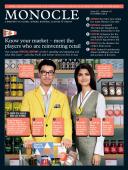
Issue 67
Know your market — meet the players who are reinventing retail.
Our 24-page Special Report on who’s spending and splurging and what they want – and why bricks and mortar stores are here to stay
In This Issue
Oops! No content was found.
Looks like we no longer have content for the page you're on. Perhaps try a search?
Return Home

